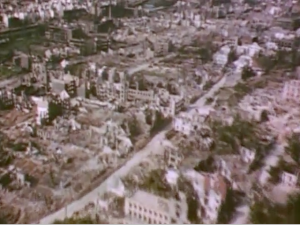Just as the Cold War turned the power that the U.S. gained after World War II against itself, climate change continues turning power against ourselves (and the rest of the world). Better dead than red, once an anti-communist slogan, takes on a new meaning as impacts from climate change grow while a sizable portion of the U.S. population denies or ignores the signs. We would rather die than suffer from being in the red (in the accounting ledger). It’s the economic equivalent of a drunken man ordering one more for the road.
We go to battle every day, spewing more carbon into the atmosphere, allowing more heat to be trapped. Unlike the Cold War, with its threat of instant annihilation from nuclear weapons, climate change is war on a much longer time scale, taking centuries (maybe only decades), to wreak similar amounts of havoc upon the world. Politically, few of the ruling elite want to make any concessions that they feel would place them in a short-term disadvantage. We have dug ourselves into trenches of apathy, not willing to take an offensive, unaware of the reeking stench of death from within. Read the rest of this entry »


